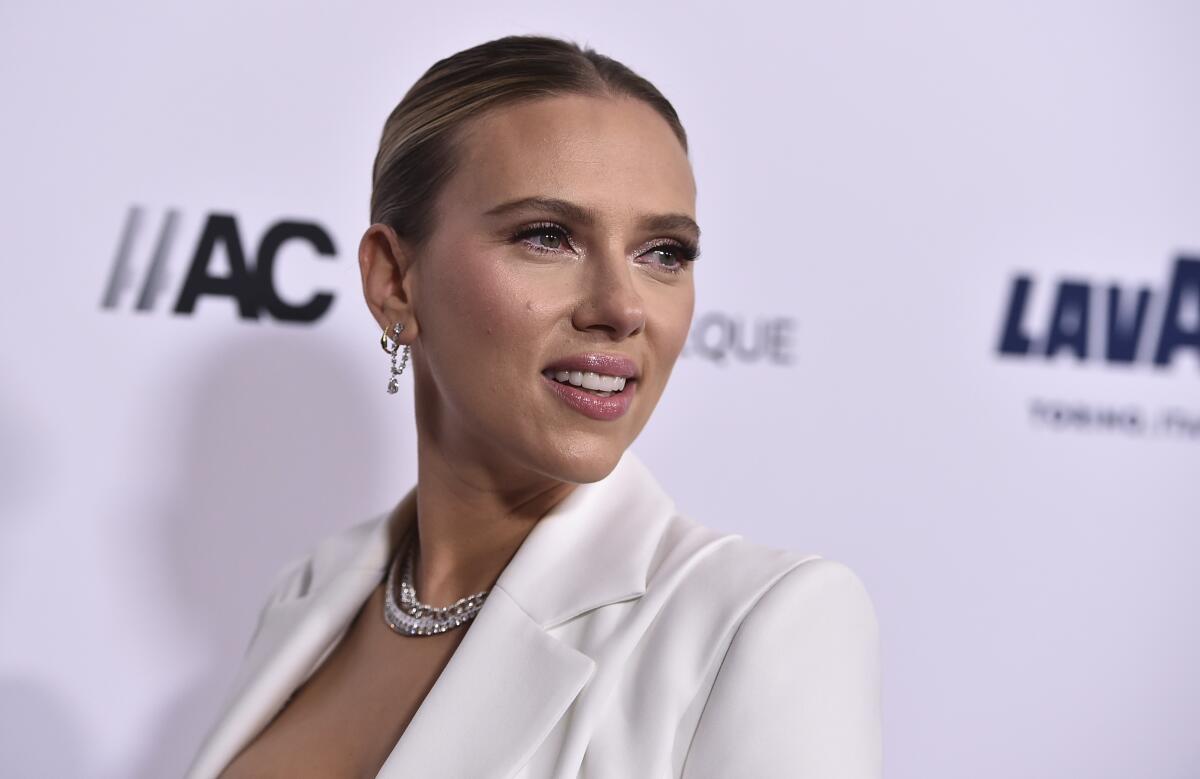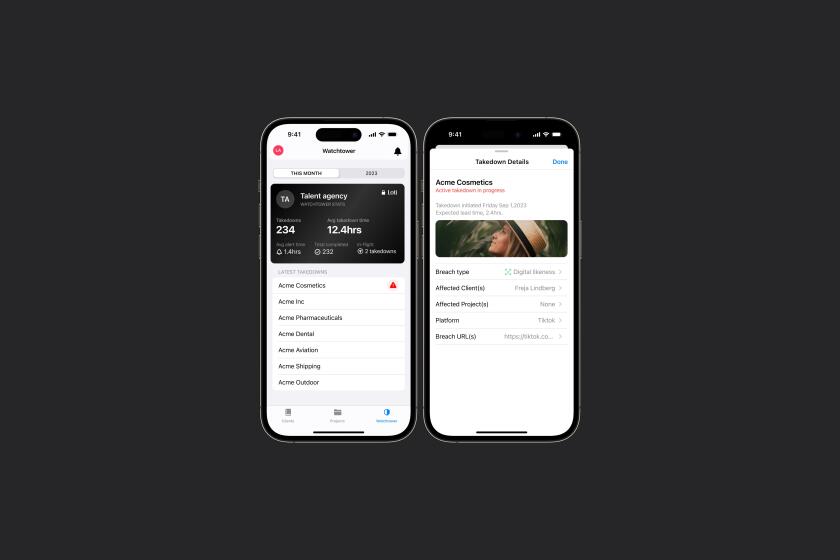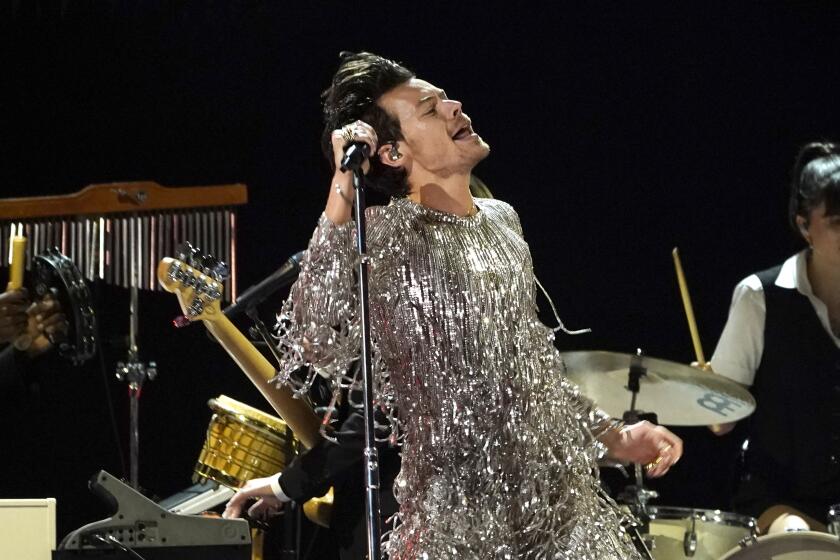Scarlett Johansson also thinks OpenAI’s new voice sounds like her. She’s not happy about it

- Share via
When OpenAI debuted its new voice assistant technology this month, it immediately drew comparisons to the 2013 Spike Jonze sci-fi film “Her.”
As it turns out, the likeness may have been too close for comfort.
Actor Scarlett Johansson, who voiced the computer program in “Her,” said she hired lawyers after discovering OpenAI released a ChatGPT voice that sounded eerily similar to hers without her granting permission.
In a Monday statement, Johansson said she was approached by OpenAI’s chief executive, Sam Altman, in September to voice the ChatGPT 4.0 system, but she declined to participate. Altman had pursued Johansson to lend her voice to the app because “he felt that my voice would be comforting to people,” Johansson said in her statement.
But after she declined, she was angered and shocked to hear a voice used in a demo by OpenAI that sounded like hers. Two days before the demo, Johansson said that Altman contacted her agent asking the actor to reconsider.
In the movie “Her,” Johansson plays “Samantha,” the disembodied voice of a computer who provides friendship and, eventually, love to a lonely man played by Joaquin Phoenix.
“In a time when we are all grappling with deepfakes and the protection of our own likeness, our own work, our own identities, I believe these are questions that deserve absolute clarity,” Johansson said in a statement. “I look forward to resolution in the form of transparency and the passage of appropriate legislation to help ensure that individual rights are protected.”
OpenAI on Monday said it is pausing the use of the voice known as “Sky,” which some people say sounds like Johansson.
“We’ve heard questions about how we chose the voices in ChatGPT, especially Sky,” OpenAI posted on X on Monday. “We are working to pause the use of Sky while we address them.”
Altman seemed to invite parallels to the film in his announcement of the interactive voice feature, saying in a blog post that it “feels like AI from the movies.” “Her” was nominated for multiple Oscars, with Jonze winning the Academy Award for original screenplay.
On May 13, Altman posted the word “her” on X, which many observers interpreted as a direct reference to the Oscar-winning movie.
Despite the striking sonic resemblance, OpenAI said that Johansson did not actually provide the voice of Sky, one of multiple voice options available on the app. Rather, another actor was using her own “natural speaking voice,” OpenAI said in a Monday blog post.
Hollywood talent agencies and producers have met with AI companies, including ChatGPT maker OpenAI, to learn about how their technologies could be used in entertainment.
“We believe that AI voices should not deliberately mimic a celebrity’s distinctive voice,” the company said.
Altman in a statement said that the company had cast the voice actor behind Sky’s voice before it had reached out to Johansson.
“The voice of Sky is not Scarlett Johansson’s, and it was never intended to resemble hers,” Altman said in a statement. “Out of respect for Ms. Johansson, we have paused using Sky’s voice in our products. We are sorry to Ms. Johansson that we didn’t communicate better.”
The controversy comes at a time when concerns have been raised within the entertainment industry about whether copyrighted material is used to train AI models.
OpenAI has said its large language models, including those that power ChatGPT, are developed through information available publicly on the internet; material acquired through licenses with third parties; and data its users and “human trainers” provide.
The company has said it believes training AI models on publicly available materials on the internet is “fair use.”
Tech company OpenAI showed off its new ChatGPT model, which now has a voice mode that allows users to interact more conversationally with the AI system.
But some media outlets, including the New York Times, have sued OpenAI, concerned about how its stories are used by the tech company.
Sony Music Group is in the process of sending out hundreds of letters to AI developers and music streaming services, including OpenAI and Google, warning them to not use its artists’ music to train generative AI tools without its permission. Actors and writers also have raised concerns about AI’s impact on their livelihoods.
Talent agencies are being proactive in protecting their clients against unauthorized use of their likeness and voice. Century City-based Creative Artists Agency is helping clients through the Vault, which scans clients’ bodies and records their movements and voices to create a digital version of them to protect against copyright infringement.
WME is partnering with Seattle-based AI and image recognition company Loti to stop unauthorized digital use of images from WME clients, including deepfakes.
Johansson is a client of CAA. CAA declined to comment.
OpenAI said that the voices for ChatGPT — called Breeze, Cove, Ember, Juniper and Sky — are from voice actors who went through an audition process. More than 400 people applied. Some of the characteristics OpenAI was seeking include “a voice that feels timeless” and “an approachable voice that inspires trust.”
The selected actors came to San Francisco to record their voices in June and July of 2023, and their voices were added in September of that year, the company said. The company said the actors were compensated with “above top-of-market rates” and that they were aware of the intentions and scope of the project.
“To protect their privacy, we cannot share the names of our voice talents,” OpenAI said.
Sony Music Group is sending more than 700 letters to tech companies and music streaming services, calling on them to not use its music to train AI without authorization from the label.
More to Read
Inside the business of entertainment
The Wide Shot brings you news, analysis and insights on everything from streaming wars to production — and what it all means for the future.
You may occasionally receive promotional content from the Los Angeles Times.














